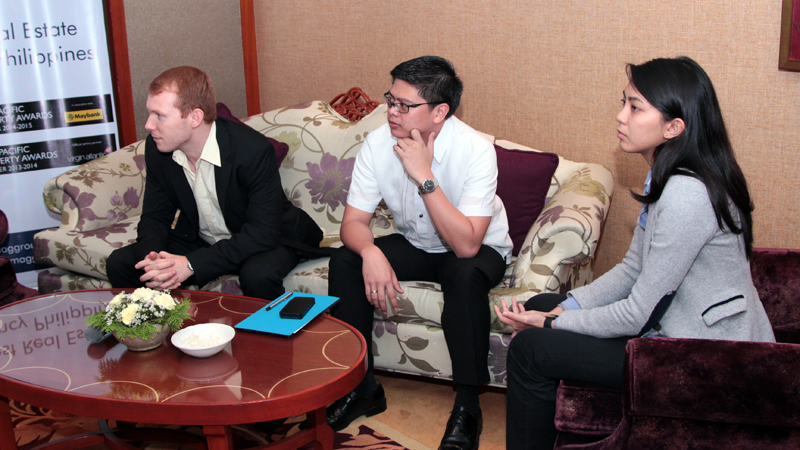5 things OFWs should consider before buying real estate in PH

Michael McCullough, Managing Director (left), Gerold Fernando, Associate Director (center), and Angela Manese, Head Residential Division (right) give their thoughts and views on the Philippine real estate sector. PHOTO COURTESY OF Ogilvy Public Relations
MANILA, Philippines — What are the most important things that an overseas Filipino worker (OFW) should consider when buying real estate property, like a house or a condominium, in the Philippines?
International real estate services firm KMC MAG Group Inc. gave several factors that Filipinos should consider. Ironically, money isn’t the most important consideration.
1. What is the purpose for buying a property?
According to Angela Manese, Residential Division Manager of KMC MAG Group Inc., OFWs should first think about what they intend to do with the property once they have bought it.
“Are they buying it so they can eventually live in it or are they buying it to eventually use it as an investment opportunity which means to rent it out or to sell it,” Manese said in an interview after a round table discussion with reporters Thursday.
“Generally among our Southeast Asian neighbors, acquiring a property in Manila is more affordable per square meter than buying [in other countries],” she said.
Article continues after this advertisementWhen they know what their ultimate goal with the property is, then another set of factors will have to be considered.
Article continues after this advertisement2. Does the developer have a proven track record?
“The factors they need to consider if they intend to live in it is, who the developer is and does that developer really deliver what they promise to deliver,” Manese said.
The usual practice when it comes to residential units is they are sold through pre-selling which means the buyer does not really see yet what they are buying. This makes it important to consider the track record of the developer.
“If they intend to live in it, it’s all a matter of personal preference. What matters to them, like do they want to be close to a mall or is that too noisy, do they want it more private, do they want to be near hospitals, do they want to be near a school? It’s more of a lifestyle choice,” she said.
3. Will the property be offered for rent? How and for whom?
“It’s a different story altogether if they’re buying to eventually have it rented out,” Menase said.
A crucial factor that many OFWs forget is who will take care of the property while the OFW is still out of the country.
“Their families are in the province and the property is in BGC or in Makati so when a tenant wants to have a look at the unit, where is the key?” she said.
“It’s very crucial who looks after the property while they are away. The logistics is one thing that they forget and it’s sad because some agents are only looking to make a profit. They inform a buyer that they will take care of renting it out but after the property has been sold, the agent disappears,” Menase added.
The second thing to consider is who do they want to rent it out to like office workers, expats, or possibly students?
Most tenants who are looking for a place to rent are office workers or expats so the location should be considered as to which business district they have to cater to; whether inOrtigas, Makati, or BGC.
4. Buy low and sell high is not as easy as it sounds in the real estate market.
For some OFWs looking to buy real estate in order to sell it again a couple of years later when the market price has appreciated, Manese warned that it’s not as simple as it sounds.
“A lot of the selling points of real estate agents is ‘buy from me now and two years later I can help you sell it at a higher price.’ Its very ideal, you buy at P1 million then sell at 1.5 million two years later,” Manese said.
“Technically it’s easy and it’s doable. But the challenge, and what is not put into consideration is, when you buy now for P1 million, two years from now you try to sell it but there are still other properties for sale at that time at P1 million which you are competing with,” she said.
The simplicity of the transaction is overstated because properties are not as easy to sell as most people expect, Manese said.
“Our suggestion about that is, you buy, but your timeline has to be expanded a little. It’s not like tomorrow you will be able to sell it immediately. It’s a matter of managing expectations,” she said.
5. What do foreigners think about the Philippine real estate industry?
Many foreigners have bought residential units in the country because they like it here, Manese said.
“In general, some Singaporeans invest in the country because they like it. A lot of them enjoy the Philippines,” she said.
“They think ‘I enjoy the country and I visit it a lot. Why not buy a property [in the Philippines] instead of buying [in Singapore].’ It’s like a win-win situation for them,” Manese added.
Many foreigners also come in to buy property which they either rent-out or wait a few years then sell it.
“If not for investment purposes, it’s their personal preference. They just like the country that much, or they have a family here and plan to settle down. It just makes sense to invest in property here,” Manese said.
RELATED STORIES
Real estate firm inireklamo sa pangloloko